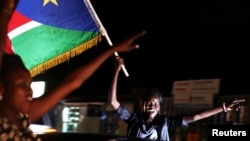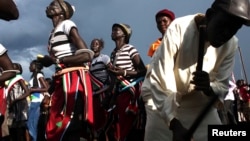JUBA —
The searing midday heat at Juba’s main stadium couldn't deter revelers from the dancing, singing and cheering that started at dawn to mark the second birthday of the world's youngest nation.
After decades of figthing to free itself from Sudan, South Sudan became the world’s newest sovereign state on July 9, 2011. While its first two years brought it to the brink of renewed war with the north and near-economic collapse after switching off its oil — its only source of foreign revenue — crowds of people waving or dressed in flags rejoiced on the second anniversary of independence as if it were the first.
Amid the celebration, however, questions about the young country's future came to the forefront in a speech by President Salva Kiir.
His government's reputation already tarnished by rampant corruption and a dearth of basic services, Kiir promised to deliver services and vowed that corruption would not be the legacy of independence, insisting a crackdown would start at the national government level and soon extend to counties and villages.
Aside from a bloated public sector and massive army, unemployment was another primary issue Kiir addressed. Following the crackdown on corruption, he said, public money would finally deliver “fruits of peace” such as education, health and clean water, which would lead to development and job creation in one of the most underdeveloped nations on earth.
The president’s promise of proper education for all — not just the elite whose children learn abroad — is exactly what 16-year-old Grace Alek wanted to hear.
“I want them to build up this country and make the country good, and [improve] all the schools — secondaries and primaries," he said. "A better education. We need that, because now there’s not better education, still. After two years we need a good education.”
Since shutting off oil exports to Sudan in 2012 following a dispute with officials in Khartoum, South Sudan's basic services are currently delivered by a raft of aid agencies that are faced with government taxation in the absence of crude subsidies.
Accusing Sudan of stealing its crude and bombarding troops and oil fields along a largely undefined border, South Sudan, girding for the prospect of renewed warfare, reneged on plans to reduce its state security apparatus, which consumes nearly 40 percent of its annual budget, and instead began recruiting new conscripts.
Public health student Taban Michael Peter, who can’t find a job in the health sector despite massive need, says that the key to development in South Sudan is fighting corruption.
"Corruption is what is hindering the development of South Sudan," he said, explaining that it is not just the billions in oil revenue that have been spirited away, but also donor aid. "Since the signing of the CPA until now, if you look at the funds that are brought from outside the country to help this county to develop, it has been corrupted by individuals, so it leave us poor, it left the country like this. Today we are celebrating our second anniversary, so we need to fight corruption and catch the rest of the world.”
While Kiir also slammed security forces for committing abuses on civilians in Jonglei state, he specifically condemned rebel leader David Yau Yau for what he termed “senseless deaths” of vengeance.
Vowing that impunity for such acts of violence and crime is over, Kiir also pledged dialogue with Sudan to secure the peace needed to make both states viable, and allow the coming generations to prosper.
But for Loking Deng, who came to the capital to seek a university education that, so far, is not available, just being free is enough.
“Today I just feel happy because today is the second anniversary, and now all people of South Sudan, today they are enjoying [freedom]," he said. "For a long time they are suffering — they are waiting for their independence, and now South Sudan is independent and it’s all okay, no problems again.”
His words show that the immense challenges facing South Sudan have not extinguished hope that the country can truly move beyond its problems and enjoy its status as an independent nation.
After decades of figthing to free itself from Sudan, South Sudan became the world’s newest sovereign state on July 9, 2011. While its first two years brought it to the brink of renewed war with the north and near-economic collapse after switching off its oil — its only source of foreign revenue — crowds of people waving or dressed in flags rejoiced on the second anniversary of independence as if it were the first.
Amid the celebration, however, questions about the young country's future came to the forefront in a speech by President Salva Kiir.
His government's reputation already tarnished by rampant corruption and a dearth of basic services, Kiir promised to deliver services and vowed that corruption would not be the legacy of independence, insisting a crackdown would start at the national government level and soon extend to counties and villages.
Aside from a bloated public sector and massive army, unemployment was another primary issue Kiir addressed. Following the crackdown on corruption, he said, public money would finally deliver “fruits of peace” such as education, health and clean water, which would lead to development and job creation in one of the most underdeveloped nations on earth.
The president’s promise of proper education for all — not just the elite whose children learn abroad — is exactly what 16-year-old Grace Alek wanted to hear.
“I want them to build up this country and make the country good, and [improve] all the schools — secondaries and primaries," he said. "A better education. We need that, because now there’s not better education, still. After two years we need a good education.”
Since shutting off oil exports to Sudan in 2012 following a dispute with officials in Khartoum, South Sudan's basic services are currently delivered by a raft of aid agencies that are faced with government taxation in the absence of crude subsidies.
Accusing Sudan of stealing its crude and bombarding troops and oil fields along a largely undefined border, South Sudan, girding for the prospect of renewed warfare, reneged on plans to reduce its state security apparatus, which consumes nearly 40 percent of its annual budget, and instead began recruiting new conscripts.
Public health student Taban Michael Peter, who can’t find a job in the health sector despite massive need, says that the key to development in South Sudan is fighting corruption.
"Corruption is what is hindering the development of South Sudan," he said, explaining that it is not just the billions in oil revenue that have been spirited away, but also donor aid. "Since the signing of the CPA until now, if you look at the funds that are brought from outside the country to help this county to develop, it has been corrupted by individuals, so it leave us poor, it left the country like this. Today we are celebrating our second anniversary, so we need to fight corruption and catch the rest of the world.”
While Kiir also slammed security forces for committing abuses on civilians in Jonglei state, he specifically condemned rebel leader David Yau Yau for what he termed “senseless deaths” of vengeance.
Vowing that impunity for such acts of violence and crime is over, Kiir also pledged dialogue with Sudan to secure the peace needed to make both states viable, and allow the coming generations to prosper.
But for Loking Deng, who came to the capital to seek a university education that, so far, is not available, just being free is enough.
“Today I just feel happy because today is the second anniversary, and now all people of South Sudan, today they are enjoying [freedom]," he said. "For a long time they are suffering — they are waiting for their independence, and now South Sudan is independent and it’s all okay, no problems again.”
His words show that the immense challenges facing South Sudan have not extinguished hope that the country can truly move beyond its problems and enjoy its status as an independent nation.





